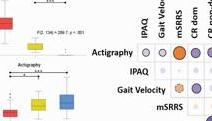23.11.2022

New paper alert: How slow is slow ? Behavioral Mapping of Psychomotor Slowing in Psychosis
In this paper, Nadesalingam et al., from S. Walther's team established a behavioral mapping if psychomotor slowing in psychosis ( slower gait, lower activity levels, and slower finger movements). Wrist-based actigraphy and observer ratings were the only scale/measurement able to clearly disentangle patients with and without psychomotor slowing. Actigraphy may become the standard assessment of psychomotor slowing in neuroimaging studies and clinical trials.